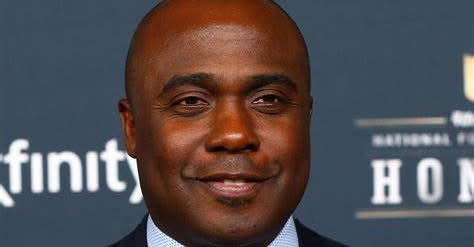The Detroit Lions’ decision to select running back Jahmyr Gibbs with the No. 12 overall pick in the 2023 NFL Draft was one of the most polarizing moves of that draft class. At a time when the running back position was increasingly being devalued in the first round, investing such a high pick, especially when the team had other perceived needs on defense and had just signed veteran David Montgomery, drew significant criticism. However, a deep dive into General Manager Brad Holmes’s philosophy reveals a key influence that shaped this seemingly unconventional choice: a profound conversation with Hall of Fame running back Marshall Faulk.
This isn’t a new revelation, but it’s a critical piece of the puzzle that often gets overlooked in the heat of draft-day debates. Brad Holmes himself has recounted the story, explaining how a past interaction with Marshall Faulk, decades before the 2023 draft, laid the intellectual groundwork for valuing a player like Gibbs so highly.
The interaction occurred early in Holmes’s career when he was a PR intern with the St. Louis Rams.1 He had the opportunity to interview Marshall Faulk, the legendary Rams running back known for his incredible versatility as a runner and receiver.2 During that conversation, Faulk shared insights into the evolving nature of the NFL and the running back position.
Holmes recalled Faulk emphasizing, “Where this game is going to, you don’t have the space,” referring to salary cap constraints and the limitations of rostering specialists. Faulk’s point was clear: in a league with tight financial restrictions, teams can’t afford to carry multiple niche running backs – a short-yardage back, a third-down back, a scat back, a goal-line back. Instead, the future belonged to backs who could “do it all.” As Holmes put it, Faulk stressed, “You’ve got to be able to do it all, man.”
This philosophy, articulated by one of the most versatile and impactful running backs in NFL history, profoundly resonated with Holmes. When he later began scouting prospects as a personnel executive and eventually as a general manager, this conversation with Faulk became a foundational lens through which he evaluated running back talent.
Fast forward to the 2023 NFL Draft and the evaluation of Jahmyr Gibbs. When Holmes and the Lions’ scouting department turned on Gibbs’s film, they saw a player who embodied exactly what Marshall Faulk had described. Gibbs, an Alabama product, wasn’t just a runner; he was a dynamic weapon.3 His scouting reports consistently highlighted his exceptional receiving ability, often noting that he ran routes like a wide receiver. He possessed elite speed, vision, and the elusiveness to break tackles and create big plays both out of the backfield and split out wide.4 He could be a home-run hitter as a runner, but his true differentiating factor was his prowess as a pass-catcher.
Holmes recognized that Gibbs was not merely a running back but a versatile offensive piece that could unlock new dimensions for the Lions’ attack.5 He could be deployed in various alignments, create mismatches against linebackers and safeties, and contribute significantly in both the running and passing games. This “do-it-all” skillset, as articulated by Faulk, made Gibbs uniquely valuable in a modern NFL offense increasingly focused on versatility and efficiency.
The decision to draft Gibbs at No. 12 was also influenced by other strategic considerations for the Lions:
1. Offensive Scheme Fit: The Lions’ offensive coordinator, Ben Johnson (now the Bears’ head coach), operates a creative and explosive scheme that leverages play-action, misdirection, and getting playmakers the ball in space. Gibbs’s speed, receiving ability, and ability to make defenders miss in the open field were a perfect fit for this vision. While they had D’Andre Swift, the team likely sought a more consistent and durable version of that “dynamic weapon” role, and Gibbs represented an upgrade in that specific mold.
2. Complement to David Montgomery: Even though the Lions had just signed David Montgomery in free agency, Gibbs was seen not as a replacement, but as a perfect complement. Montgomery is a hard-nosed, physical runner who excels between the tackles and grinds out tough yards – the “thunder” to Gibbs’s “lightning.”6 The vision was to create a dynamic one-two punch that could wear down defenses over four quarters, offering different looks and keeping both backs fresh. This committee approach has proven highly successful, with both Gibbs and Montgomery excelling in their respective roles.
3. Long-term Vision and Value: While conventional wisdom suggests not drafting running backs high, Holmes and the Lions clearly saw Gibbs as an outlier, a “special weapon” that transcended typical running back evaluations. They believed his unique skillset warranted the high investment. Furthermore, drafting a talented running back on a rookie contract provides significant value, allowing the team to allocate salary cap space to other positions.
4. Going Against the Grain: Holmes has often spoken about the importance of trusting his own evaluations and being willing to “go against the grain” rather than simply conforming to consensus opinion.7 The decision to draft Gibbs, who was widely projected as a late first-round or early second-round pick, was a prime example of this philosophy in action. It takes conviction to make such a move, and that conviction was rooted, in part, in the enduring lesson from Marshall Faulk.
In essence, Marshall Faulk’s foresight about the evolution of the running back position, articulated to a young Brad Holmes years ago, directly influenced the Lions’ high-stakes decision to draft Jahmyr Gibbs. Holmes saw in Gibbs the embodiment of that “do-it-all” back: a player who could not only run the ball effectively but also be a game-changing threat as a receiver. This vision, validated by Faulk’s experience and wisdom, allowed the Lions to defy conventional draft wisdom and select a player who has since proven to be a cornerstone of their resurgent offense, making that controversial No. 12 pick look like a stroke of genius.



